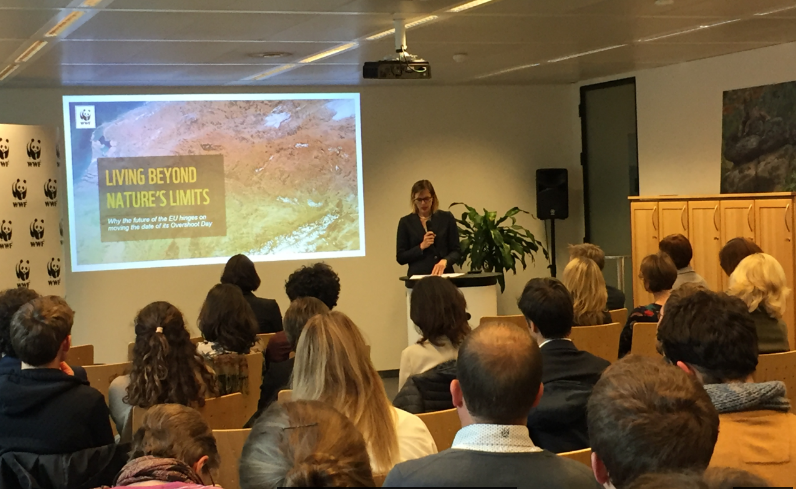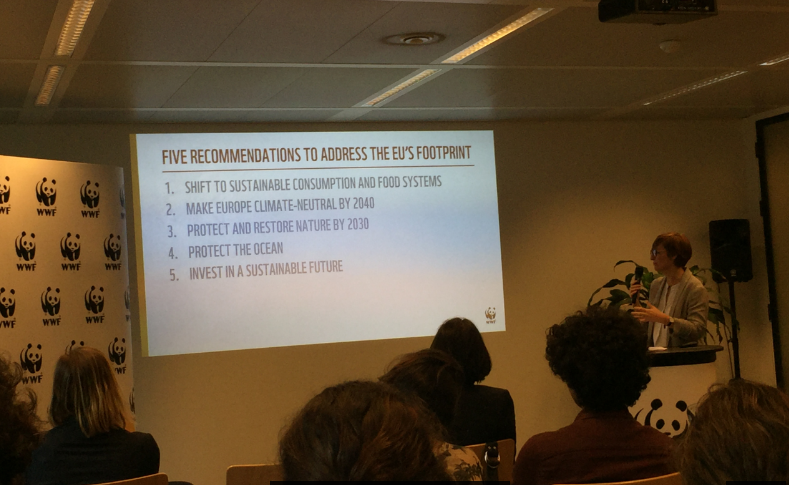10 May is EU Overshoot Day - How to reduce the EU’s Ecological Footprint? - report on a meeting on 7 May in Brussels
Discussion details




10 May is EU Overshoot Day! The Global Footprint Network and WWF have calculated that if all the people in the world had the same ecological footprint as an average EU citizen, 10 May would be the date after which humanity will have used up as much from nature than our planet can renew in this year. More so, we would need 2.8 planets if we all lived like an average EU citizen!
(Brussels, 9 May) WWF and The Global Footprint Network pre-launched their report EU Overshoot Day ‘Living beyond nature’s limits’ in Brussels on Tuesday. Ester Asin, Director of the WWF EU Office, presented the main findings from the report and WWF Policy recommendations. This was followed by interventions from Ms Kathleen Van Brempt, Belgian Member of the European Parliament, Ms Veronika Hunt Šafránková, the new Head of UN Environment’s Brussels Office, and Mr Janez Potočnik, the Co-Chair of the UN International Resource Panel and Former European Commissioner for Environment. Speakers highlighted what they think needs to be done. Their views appeared to concur with the policy recommendations in the EU Overshoot Day report.
WWF’s recommendations comprise a series of actions to decrease the EU’s Ecological footprint and to stay on track to achieve their international commitments. In short, they recommend to: shift to sustainable consumption and food systems; make Europe climate-neutral by 2040; restore nature; protect the Ocean; and invest in a sustainable future.
“If Europe is not ambitious enough, the Member States will not implement fast enough,” said Ms Van Brempt speaking from the perspective of a Belgian and Member of the European Parliament. She called for 3 game changers: first of all we need a European climate law that translates the Paris agreement into enforceable objectives. Secondly, we need to change our economic governance with a sustainable development pact. This framework needs to be based on the UN Sustainable Development Goals and take into account all social aspects. Lastly, ”we need fair taxation” she added. “If we want to save our planet and leave no one behind in the ecological transition, we need the rich to pay their taxes.“
“The EU Overshoot Day Report of WWF is a reminder to the EU to urgently bring down its ecological footprint” said Veronika Hunt Šafránková of UN Environment in her speech. According to the report, with only 7% of the world population the EU uses a disproportionate 20% share of the Earth’s biocapacity. She referred also to two recently launched UN reports: the “Global Assessment Report on Biodiversity and Ecosystem Services,” and the UN Environment’s sixth Global Environment Outlook (2019) providing further alarming figures related to drivers of environmental change, such as population growth and increasing urbanization, as well as on the state of the environment.
There is a way forward, as witnessed by a number of resolutions known as a “blueprint for change” that were adopted after the UN Environment Assembly 4 in March by over 170 UN Member States and that are aimed to tackle the environmental crisis, through for instance innovation and sustainable consumption and production.
At the EU level a lot has been done regarding policy and legislation in this field, such as the EU Biodiversity Strategy, the 2018 Circular Economy Package, legislation in nature protection and other examples. Implementation of these as well as enforcement is important.
Veronika Hunt Šafránková mentioned several opportunities for a systemic change from the UN perspective: sustainable consumption and production and circular economy; New Deal for Nature (post-2020 framework), that acknowledges for instance the value of forests, oceans and other natural capital in our financial accounts; smart and sustainable urban planning; renewable sources of energy. She pointed out that we need synergies between different policies and sectors. From UN Environment point of view we can deliver on results by engaging with people and enabling them to make informed choices; by working with partners across sectors; support science-informed policies and data-driven political solutions.
Mr Potočnik underlined in his capacity of co-chair of the UN International Resource Panel, that future generations are paying the price and that we should stop this. At the moment we are denying environmental externalities in our economies. These will need to be paid for by future generations. Basically “we are privatizing profits and socializing the costs.” He presented findings from the Global Resources Report 2019 and observed that the EU is on the one hand a champion of cooperation and at the same time thinks it is. The EU are amongst the countries with the highest footprints. "In Europe we are too self satisfied," but urgency is absolutely not here. ”The EU needs to wake up,” he said.
Mr Potočnik further highlighted the need to decouple economic growth from the use of natural resources. “If you don’t do that any economic activity worsens the situation”, he said. In addition, we need a system change, moving away from short term focus of institutions and move into strategic thinking, something that is much more present in the business world than in the political. We also need to tackle consumerism, through incentives and a more circular economy. Finally, we need to become more inclusive, make our societies more equitable and fight against social unrest and poverty; and we need to build the European agenda around a new intergenerational agreement. SDGs should be integrated all over in the next European Commission.
Log in with your EU Login account to post or comment on the platform.